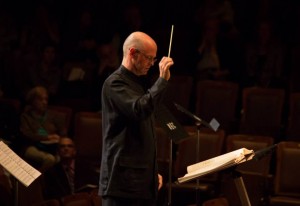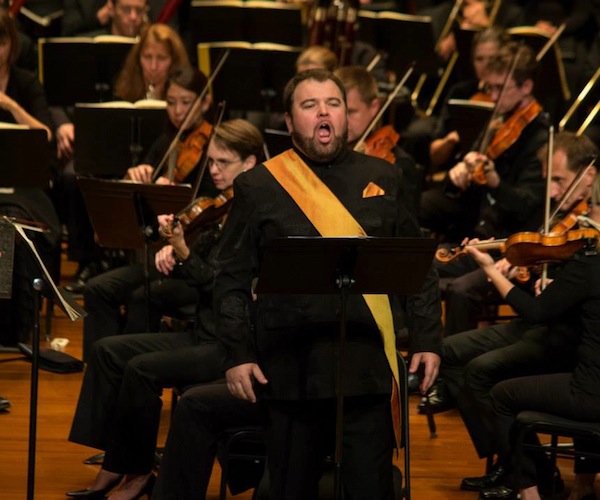Opera Review: A Triumphant Bang of a “Rienzi” From Odyssey Opera
For their debut on Sunday, Odyssey Opera and conductor Gil Rose could hardly have picked a more spectacular, unfamiliar epic than they did.
Rienzi, der Letzte der Tribunen, by Richard Wagner. Staged by Odyssey Opera. Gil Rose, conductor. At Jordan Hall, Boston, MA, September 15.
By Jonathan Blumhofer
Considering the number of world-class orchestras in Boston, it’s ironic that opera should languish here. But it has: the sudden demise in late 2011 of Opera Boston was a reminder of the precarious existence of opera companies in town, even the most adventuresome. Happily, Opera Boston’s music director happened to be Gil Rose, a man who, in the last twenty years, has been in the business of filling major gaps in the national orchestral scene. With his other band, the Boston Modern Orchestra Project, Mr. Rose last fall presented a staged version of Michael Tippett’s The Midsummer Marriage, a production lost with Opera Boston’s demise. And this year, the indefatigable Mr. Rose is back with the city’s newest opera company, Odyssey Opera.
Odyssey Opera looks to continue, at least after a fashion, Opera Boston’s invaluable mission: presenting familiar and lesser-known masterpieces plus new works. Mr. Rose has gone on record stating that the plan is for a fall concert performance to be followed by a late spring staging of something smaller that will then run for several weeks. And for their debut on Sunday, Odyssey and Mr. Rose could hardly have picked a more spectacular, unfamiliar epic than they did.
Modeled on the grand opera tradition of Meyerbeer and Spontini, Rienzi, der letzte der Tribunen (“Rienzi, Last of the Tribunes”) was Richard Wagner’s third completed opera and, in his lifetime, proved to be his greatest popular success. Its plot adapted Edward Bulwar-Lytton’s 1835 novel of the same title, about a man (Rienzi) who dreams of creating a great Italian empire with Rome as its capital. But Rienzi’s popular success brings resentment and anger from the nobles and, eventually, they stir the people up against him. The opera ends in a mini-Götterdämmerung, with Rienzi, his sister Irene, and Irene’s suitor Adriano, engulfed in the flames and ruins of the Roman Capitol.
Though Wagner later disavowed the opera, claiming (among other things) that it was “too Italian,” no other composer could have written it. The dramatic structure closely foreshadows Tannhäuser and Lohengrin, and the final scene, in which Adriano rides into the burning Capitol on a steed, uncannily presages the end of the Ring Cycle. And the music sounds like no one else’s: from the long, breathless melodic lines to the stirring, distinctly German-sounding marches, the opera’s tunes have Wagner’s fingerprints all over them.
One of the great triumphs of 19th century opera, it’s easy to see why Rienzi was so popular: between its arias, ensemble numbers, brilliant choral writing, and extended orchestral episodes, there’s something in Rienzi for just about everyone. And Wagner’s sense of the theatrical is ever present, nowhere more so than in the fourth act, with its antiphonal off-stage brass and drums.
Though it’s still performed with some frequency in Europe, Sunday’s concert performance marked the first time Rienzi has been given complete in Boston. And, coming on the heels of Boston Lyric Opera’s Der fliegende Holländer and a pair of Boston Symphony all-Wagner concerts (one subscription series at Symphony Hall and an evening devoted to Act 3 of Die Walküre at Tanglewood), this event made the perfect capstone to local celebrations of Wagner’s bicentenary. It certainly left the biggest impression.
Mr. Rose has assembled a tremendous ensemble for the Odyssey Orchestra. If they sound like they’ve been playing together for a while, it’s because most of them have been: the roster includes many familiar faces from BMOP, the Boston Philharmonic, and other preeminent local groups. On Sunday they made an ideal Wagner band. As with all Wagner’s mature work, Rienzi is as much symphony as opera and, beginning with a stately account of the Overture, the Odyssey Orchestra brought the involved orchestral writing thrillingly to life, capturing its every nuance and electrifying impulse.
If only that spirit could have been reflected in tenor Kristian Benedikt’s account of the title role. Maybe he was just having an off night, but Mr. Benedikt’s performance was a reminder that quality heldentenors are few and far between. It was particularly hard to take him seriously as Wagner’s ill-fated, charismatic leader: his voice generally lacked warmth and sweetness, and sounded forced through most of the evening. In Act 5, he rallied – Rienzi’s prayer was imbued with nobility and deep emotion, and his final interactions with the Roman populace were particularly vigorous – but, in general, Mr. Benedikt struggled to be heard, both above the orchestra and among the bigger voices of the ensemble.
Far better cast was soprano Elisabete Matos as Rienzi’s sister, Irene. Ms. Matos’s voice is a powerful instrument, but she knows how to wield it. She can soar over a big orchestra effortlessly, as witnessed by her spectacular displays at the ends of Acts 2 and 5. But in the more intimate pairings between Irene and her suitor, Adriano, she reined in her power, revealing a pleasing sweetness and vulnerability. Despite its size, her voice is also remarkably agile – her intonation on Sunday was spot on and perpetually impressive as she navigated the music’s many high, florid passages.
The star of the show, though, was soprano Mary Jane Wray, whose account of the opera’s travesty role, Adriano Colonna, was full of fire. Indeed, she sounded like her life depended on every note that she sang. It certainly didn’t hurt that Adriano is perhaps the most three-dimensional character in the opera and Wagner wrote some of the opera’s best music for this part. Ms. Wray reveled in every bar of it. Her lower range is particularly rich and dark; though she didn’t require it for much of the opera, the moments that called for that tessitura were striking. Similarly, her upper register is pure and clear – never shrill or forced – and carried over the orchestra with ease. Whenever she was on stage, you couldn’t take your eyes (or ears) off of her.
In the smaller roles, David Kravitz, Stephen Salters, Ethan Bremner, and Robert Honeysucker were convincing as conspiratorial noblemen seeking Rienzi’s downfall. Also striking was Christina English’s brief appearance as the Messenger of Peace.
The Odyssey Opera Chorus sounded strong throughout, though it took a little while for things to really gel: their unaccompanied singing in Act 1 felt stiff and cool, but they gradually warmed. Their best moments came during the opera’s grimmer sections – the turbulent crowds in Acts 3 and 5 were especially menacing – and they handled Wagner’s extended martial episodes with vigor. Also, the superb Lorelei Ensemble made the most of their brief appearance in Act 2 with singing that married pristine intonation and tonal bloom with lithe articulation.
Unfortunately, Jordan Hall is not an ideal space for performing Wagner, especially such big Wagner as Rienzi. Its cozy size makes even the music’s smaller moments feel in your face; the big climaxes are often deafening (and not always in a good way). Credit should go to Mr. Rose for achieving as much textural clarity as he did. For the most part, everything going on could be heard, even when it was very loud. Continually problematic, though, were the ensemble numbers that closed several of the acts: here the soloists were invariably covered in the choral/orchestral din – they might as well have not been singing, except for Ms. Matos and Ms. Wray, who occasionally cut through.
Whatever the future holds for Odyssey Opera, Mr. Rose and company have started off with a triumphant bang. And, as the big opening act of the 2013-14 concert season, they’ve set the bar pretty high for whatever comes next.
Jonathan Blumhofer is a composer and violist who has been active in the greater Boston area since 2004. His music has received numerous awards and been performed by various ensembles, including the American Composers Orchestra, Kiev Philharmonic, Camerata Chicago, Xanthos Ensemble, and Juventas New Music Group. Since receiving his doctorate from Boston University in 2010, Jon has taught at Clark University, Worcester Polytechnic Institute, and online for the University of Phoenix, in addition to writing music criticism for the Worcester Telegram & Gazette.
Tagged: Gil-Rose, Kristian Benedikt, Mary Jane Wray, Odyssey Opera, Richard Wagner


